More on this book
Community
Kindle Notes & Highlights
by
Seth Godin
Read between
July 13 - July 13, 2020
Winners quit all the time. They just quit the right stuff at the right time.
Quit the wrong stuff. Stick with the right stuff. Have the guts to do one or the other.
Believe it or not, quitting is often a great strategy, a smart way to manage your life and your career.
With limited time or opportunity to experiment, we intentionally narrow our choices to those at the top.
Scarcity makes being at the top worth something.
The problem with infinity is that there’s too much of it.
Faced with infinity, people panic.
Just about everything you learned in school about life is wrong, but the wrongest thing might very well be this: Being well rounded is the secret to success.
In a free market, we reward the exceptional.
The people who skip the hard questions are in the majority, but they are not in demand.
Strategic quitting is the secret of successful organizations. Reactive quitting and serial quitting are the bane of those that strive (and fail) to get what they want. And most people do just that. They quit when it’s painful and stick when they can’t be bothered to quit.
Almost everything in life worth doing is controlled by the Dip.
Successful people don’t just ride out the Dip. They don’t just buckle down and survive it. No, they lean into the Dip.
a Cliff—it’s a situation where you can’t quit until you fall off, and the whole thing falls apart.
The Dip creates scarcity; scarcity creates value.
The Cul-de-Sac and the Cliff Are the Curves That Lead to Failure
If you find yourself facing either of these two curves, you need to quit. Not soon, but right now. The biggest obstacle to success in life, as far as I can tell, is our inability to quit these curves soon enough.
If you haven’t already realized it, the Dip is the secret to your success.
In a competitive world, adversity is your ally. The harder it gets, the better chance you have of insulating yourself from the competition. If that adversity also causes you to quit, though, it’s all for nothing.
Here’s the good news: The fact that it’s difficult and unpredictable works to your advantage. Because if it were any other way, there’d be no profit in it.
The reason we’re here is to solve the hard problems.
The Dip is the reason you’re here. It’s not enough to survive your way through this Dip. You get what you deserve when you embrace the Dip and treat it like the opportunity that it really
And yet the real success goes to those who obsess. The focus that leads you through the Dip to the other side is rewarded by a marketplace in search of the best in the world. A woodpecker can tap twenty times on a thousand trees and get nowhere, but stay busy. Or he can tap twenty-thousand times on one tree and get dinner.
It’s easier to be mediocre than it is to confront reality and quit.
If the journey you started was worth doing, then quitting when you hit the Dip just wastes the time you’ve already invested.
Simple: If you can’t make it through the Dip, don’t start. If you can embrace that simple rule, you’ll be a lot choosier about which journeys you start.
If you want to be a superstar, then you need to find a field with a steep Dip—a barrier between those who try and those who succeed.
If you’re going to quit, quit before you start. Reject the system. Don’t play the game if you realize you can’t be the best in the world.
The next time you catch yourself being average when you feel like quitting, realize that you have only two good choices: Quit or be exceptional. Average is for losers.
While starting up is thrilling, it’s not until you get through the Dip that your efforts pay off.
Short-term pain has more impact on most people than long-term benefits do, which is why it’s so important for you to amplify the long-term benefits of not quitting. You need to remind yourself of life at the other end of the Dip because it’s easier to overcome the pain of yet another unsuccessful cold call if the reality of a successful sales career is more concrete.
Persistent people are able to visualize the idea of light at the end of the tunnel when others can’t see it. At the same time, the smartest people are realistic about not imagining light when there isn’t any.
The decision to quit or not is a simple evaluation: Is the pain of the Dip worth the benefit of the light at the end of the tunnel?
you realize you’re at a dead end compared with what you could be investing in, quitting is not only a reasonable choice, it’s a smart one.
“Never quit something with great long-term potential just because you can’t deal with the stress of the moment.” Now that’s good advice.
Quitting when you’re panicked is dangerous and expensive.
To succeed, to get to that light at the end of the tunnel, you’ve got to make some sort of forward progress, no matter how small.
It’s Almost Impossible to Overinvest in Becoming the Market Leader.
All our successes are the same. All our failures, too.
We succeed when we do something remarkable.
We fail when we give up...
This highlight has been truncated due to consecutive passage length restrictions.
We succeed when we are the best in the world...
This highlight has been truncated due to consecutive passage length restrictions.
We fail when we get distracted by tasks we don’t have...
This highlight has been truncated due to consecutive passage length restrictions.


